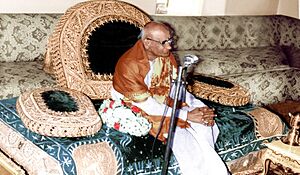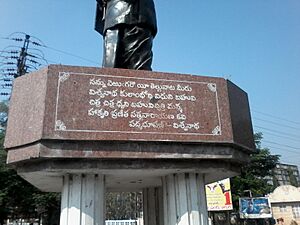Viswanatha Satyanarayana facts for kids
Quick facts for kids
Viswanadha Satyanarayana
|
|
|---|---|
 |
|
| Born | 10 September 1895 Nandamuru, Krishna District, Madras Presidency, British Indian (now Andhra Pradesh, India) |
| Died | 18 October 1976 (aged 81) Guntur, Andhra Pradesh |
| Occupation | Poet |
| Period | 1919–1976 |
| Notable awards |
|
| Spouse | Varalakshmi |
| Children | 3 |
Viswanatha Satyanarayana (born September 10, 1895 – died October 18, 1976) was a famous Telugu writer from the 20th century. He wrote many different kinds of works, including poetry, novels, plays, short stories, and speeches.
His writings covered a huge range of topics. He explored history, philosophy, religion, and how societies work. He also wrote about political science, how languages are used, and even how our minds and feelings work.
Viswanatha was a student of the well-known Telugu writer Chellapilla Venkata Sastry. He wrote in both old and new styles, sometimes using very complex language. Some of his most popular works are Ramayana Kalpavrukshamu, Kinnersani Patalu (Mermaid songs), and the novel Veyipadagalu (The Thousand Hoods).
He received many important awards. In 1970, he won the Jnanpith Award, which was the first time a Telugu writer received this honor. In 1971, he was also given the Padma Bhushan award.
Some writers who preferred a simpler, "free-verse" style criticized him. They felt he stuck too much to strict poetry rules like rhyme and meter. However, Viswanatha created a wide variety of literature. No other writer in Telugu at that time could match his deep understanding of so many subjects or his amazing skill in writing.
Contents
Early Life and Education
Viswanatha Satyanarayana was born on September 10, 1895. His parents were Shobhanadri and Parvathi. His family lived in Nandamuru, which is now in Andhra Pradesh, India.
When he was a child, he went to a Veedhi Badi, which was a type of informal street school common in India back then. Village life and traditional street performers greatly influenced him. These performers told stories, sang, danced, and created poetry on the spot. This helped shape his ideas and how he told stories later on. He also learned about the strong bonds between villagers, no matter their social background.
At age 11, he moved to Nobel College in Bandar for his upper primary education. His father wanted him to learn English, hoping it would help him find a good job.
Viswanatha also worked as the first principal of Karimnagar Government College from 1959 to 1961.
Exploring History in Novels
Viswanatha believed that history is more than just stories about kings. He thought it should also show how people lived. This includes their social life, politics, economy, culture, science, and beliefs over time.
He wrote three series of novels based on historical timelines. These novels explored different parts of ancient and medieval societies. They also told stories about famous people from three royal families:
- Purana Vaira Granthamala: This series has 12 novels. They are about the Magadha Royal families after the Mahabharata war. These stories show two main ideas: good (like Krishna) and bad (like Jayadratha). The characters in each novel are influenced by these two sides.
- Nepala Rajavamsa Caritra: This series has 6 novels about the Nepali Royal families. These books explain a type of ancient Indian philosophy called Carvaka. They also show how this philosophy affected social life and values.
- Kashmira Rajavamsa Caritra: This series also has 6 novels. They are about the Royal families who ruled Kashmir.
His Literary Works
Viswanatha wrote a huge number of literary works. He created:
- 30 poems
- 20 plays
- 60 novels
- 10 critical essays
- 200 short poems (Khand kavyas)
- 35 short stories
- 70 essays
- 50 radio plays
- 10 essays in English
- 10 works in Sanskrit
- 3 translations
- Many introductions and radio talks
Some of his poems and novels have been translated into other languages. These include Hindi, Tamil, Malayalam, Urdu, and Sanskrit. His novel Veyipadagalu was even translated into Hindi by a former Prime Minister, PV Narasimha Rao.
Novels by Viswanatha
Most of Viswanatha's novels show how society changes over time. They also deeply explore culture, human nature, and our thoughts.
- Veyipadagalu (The Thousand Hoods)
- Swarganiki Nicchenalu (Ladders to Heaven)
- Terachi Raju (Checkmate)
- Cheliyali Katta (The Seawall)
- Maa Babu (Our Babu - a word for son, dad, or owner)
- Jebu Dongalu (Pickpocketers)
- Veera Valladu (Valla the Valorous)
- Vallabha Mantri (The Minister Vallabha)
- Vishnu Sharma English Chaduvu (Vishnu Sharma Learning English): This funny story is about two great Indian writers trying to learn English. It makes fun of English grammar. This novel has been turned into a play and a TV film.
- Pulula Satyagraham (Tigers Satyagraha)
- Devatala Yuddhamu (The Battle of Gods)
- Punarjanma (Rebirth)
- Pariksha (Exam)
- Nandigrama Rajyam (Kingdom of Nandigam)
- Banavati
- Antaratma (The Conscient Self)
- Ganguly Prema Katha (Ganguly's Love Story)
- Aaru Nadulu (Six Rivers)
- Chandavolu Rani (The Queen of Chandavolu)
- Pralayanaadu
- Ha Ha Hu Hu: This is the name of a mythical horse-faced demigod.
- Mroyu Tummeda (The Humming Bee): This book deeply explores traditional Indian music and how sound affects our minds.
- Samudrapu Dibba (Ocean Dune)
- Damayanti Swayamvaram (Princess Damayanti's Choice of Husband)
- Neela Pelli (Neela's Wedding)
- Sarvari Nundi Sarvari Daka (From Night to Night)
- Kunaluni Sapamu (The Curse of Kunala)
- Ekaveera (The Sacred Love of Two Warriors)
- Dharma Chakramu (The Wheel of Righteous Order)
- Kadimi Chettu (A Tree)
- Veera Puja
- Sneha Phalamu (Fruit of Friendship)
- Baddana Senani (The General Baddana)
Purana Vaira Granthamala Series
- Bhagavantuni meeda paga (Vengeance Against God)
- Nastika Dhumamu (The Smoke of Disbelief)
- Dhumarekha (The Line of Smoke)
- Nando raja bhavishyati (Nanda Will Be the King)
- Chandraguptuni Swapnamu (Chandragupta's Dream)
- Ashwamedhamu
- Nagasenudu
- Helena
- Puli Muggu (The Tiger-Rangoli)
- Amrutavalli
- Nivedita
Nepala Rajavamsa Series
- Dindu Kindi Poka Chekka (The Betel Nut Under the Pillow)
- Chitli Chitlani Gajulu (The Half Broken Bangles)
- Saudamini
- Lalita Pattanapu Rani (Queen of the Town Named After Lalita)
- Dantapu Duvvena (Ivory Comb)
- Duta Meghamu (Cloud-Messenger)
Kashmira Rajavamsa Series
- Kavalalu (Twins)
- Yasovati
- Patipettina Nanemulu (The Buried Coins)
- Sanjeevakarani (The Medicinal Herb)
- Mihirakula
- Bhramara Vasini (Goddess of the Humming Bee)
Poetry by Viswanatha
- Srimad Ramayana Kalpavrukshamu: This is the major work for which he received the Jnanapith Award. It means 'Ramayana, the divine wish-granting tree'.
- Andhra Pourushamu (The Andhra Valor)
- Andhra Prashasti (Fame of Andhras)
- Ritu samharamu (Ending of the Season Cycle)
- Sri Kumarabhyudayamu (Emergence of Kumara)
- Girikumaruni prema geetaalu (Love Songs of Giri Kumara)
- Gopalodaharanamu (About Gopala)
- Gopika geetalu (The Gopika's Songs)
- Jhansi Rani
- Pradyumnodayamu (Rise of Pradyumna)
- Bhramara geetalu (Songs of the Humming Bee)
- Maa swamy (Our Lord)
- Ruru charitramu (Story of Ruru)
- Varalakshmi trishati (300 Verses to Varalakshmi)
- Devi trishati (300 Verses in Devotion to the Mother Goddess, in Sanskrit)
- Vishwanatha Panchashati (500 Verses to Deities)
- Vishwanatha madhyaakkaralu (Poems written in the 'madhyaakkara' meter)
- Veni bhangamu (Violating the Stream/Plat)
- Sashi duutamu (Moon-Messenger)
- Sringara veedhi (The Streets of Romance)
- Sri Krishna Sangeetamu (Krishna Music)
- Naa Ramudu (My Rama): An introduction to his ideas about Rama, explained in Kaplavrikshamu.
- Sivarpanamu (Ode to Siva)
- Dharmapatni (Consort)
- Bhrashta yogi (Fallen Yogi)
- Kedara gowla
- Goloka vasi (The Lord of Goloka)
Plays by Viswanatha
- Gupta Pasupatam (The Secret Pasupata)
- Amrita Sarmistham (in Sanskrit)
- Anta Natakame (All is Drama)
- Anarkali
- Kavyaveda Harischandra
- Talli leni pilla (Motherless Girl)
- Trishulamu (The Trident)
- Nartanashala (The Dance Theater)
- Pravahamu (The Flow)
- Lopala-bayata (In & Out)
- Venaraju
- Ashokavanamu
- Shivaji – Roshanara
- Dhanya Kailasamu
- A collection of 16 short plays
Other Writings
- Kinnerasani Patalu
- Yati geetamu
- Kokilamma Pelli
- Paamu paata
- Chinna kathalu (Short Stories)
- What is Ramayana to me
- Atma katha (Autobiography)
Awards and Honors
Viswanatha Satyanarayana received many important awards and honors for his literary contributions:
- He was given the special title "Kavi Samrat", which means "Emperor of Poets".
- In 1964, the Andhra Viswa Kala Parishat honored him with the title "Kalaprapoorna".
- In 1942, he was honored in Gudivada by being carried on an elephant (called gajarohana). His 60th birthday celebrations (shashtipoorthi) were also held there in 1956.
- Sri Venkateswara University gave him an honorary D. Lit. Degree.
- In 1962, he received the Kendra Sahitya Academy Puraskaram for his work "Viswanatha Madhyakkaralu".
- In 1970, the Andhra Pradesh Government named him their official laureate (a poet honored by the state).
- In 1970, the Indian government awarded him the Padma Bhushan, a high civilian honor.
- In 1971, he received the prestigious Jnanpith Award for his book Ramayana Kalpavruksham. He was the very first Telugu writer to win this award.
 | Delilah Pierce |
 | Gordon Parks |
 | Augusta Savage |
 | Charles Ethan Porter |



